The Lesson of 9/11 Is That Israel Cannot Win Its Gaza War
Biden says he doesn’t want Israel to repeat America’s mistakes, so why is he supporting Israel as it does exactly that?
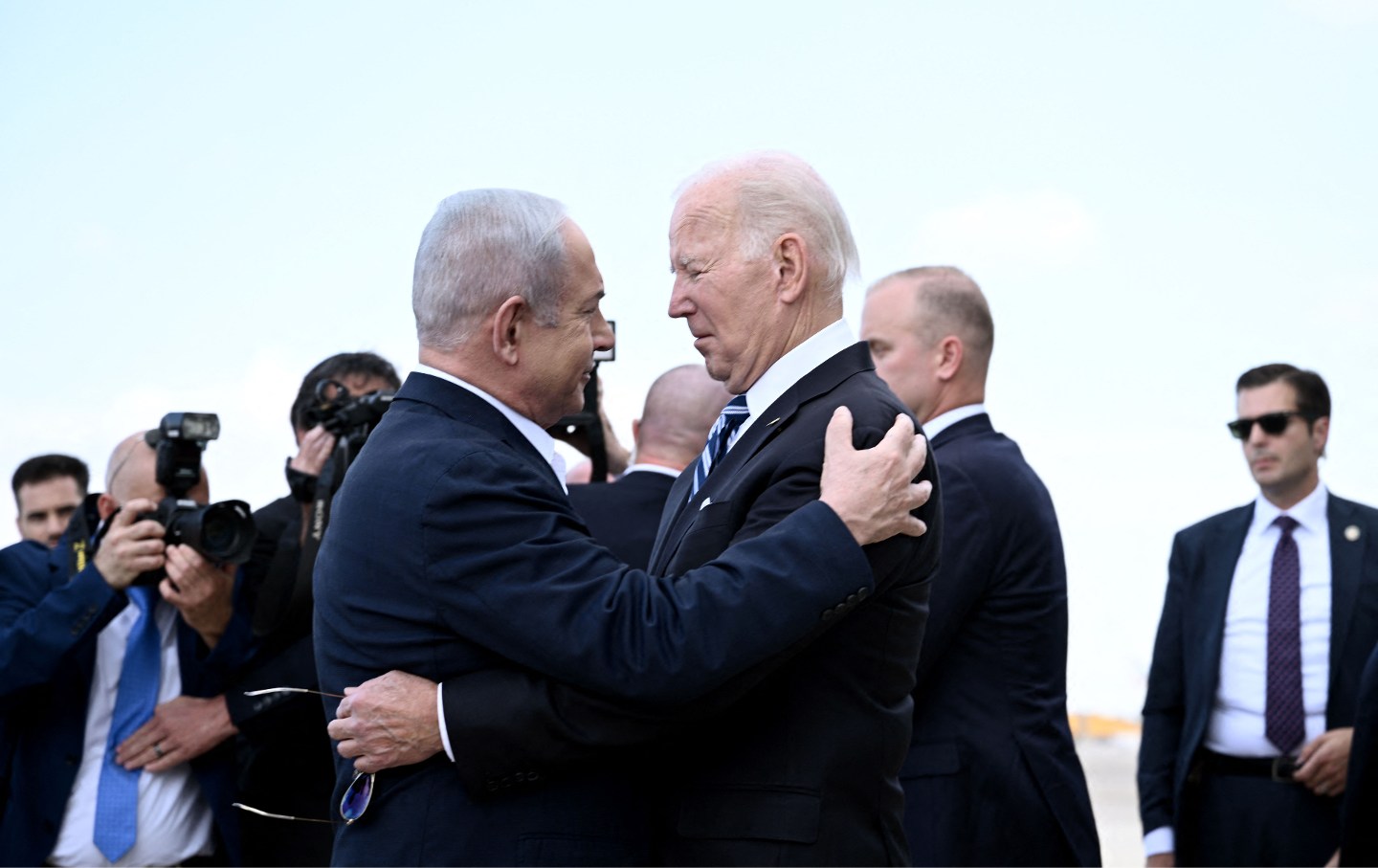
Benjamin Netanyahu greets Joe Biden upon his arrival at Tel Aviv’s Ben Gurion airport on October 18, 2023.
(Brendan Smialowski / AFP via Getty Images)Imagine for a moment that America never invaded Afghanistan after 9/11.
Imagine that in an alternate universe a variant of George W. Bush decided to test the Taliban’s offer to hand over Osama bin Laden for trial in a third country in exchange for the ample proof the United States had of his culpability, rather than rejecting it as a cynical tactic to delay the war. Imagine that this ersatz Bush focused the US’s military, intelligence, and law enforcement powers, then at their post–Cold War heights, exclusively on the Al Qaeda leadership that designed and orchestrated the attacks.
At the time, it would have been supremely politically risky, given the bloodlust that had consumed the country. And the outcome of the approach would have been uncertain. There would have been relentless pressure on doppelgänger-Bush to escalate this more targeted response as it hit some inevitable snags.
We can only imagine this alternate timeline. But the consequences of the real-world decision to invade Afghanistan as the first act in a Global War on Terror are all too clear. We don’t have to imagine what choosing another path would have spared us. We would have been spared a futile, pitiless war that lasted two entire decades—a war marked by atrocities, one that by conservative estimates killed at least 176,000 people. We would have been spared a war that never had a coherent, credible plan for victory, despite the relentless prevarications to the contrary by an entire generation of US policymakers. We would very likely have been spared the Iraq War, as well, with its own abyss of agonies and futilities. We definitely would have been spared the decisive Taliban victory of August 2021.
It should not be controversial to recognize that it would have been better never to have fought the war at all. That is why it is sickening to watch President Biden warn Israeli Prime Minister Benjamin Netanyahu to heed the lessons of 9/11 while simultaneously giving Israel carte blanche for its collective punishment of Gaza. In the name of avenging the Hamas atrocities of October 7, Biden is letting Israel pursue a course of civilian bloodletting, rather than choose a path that is politically riskier but that, as we in the US know all too well by now, is likelier to yield a better outcome.
That path can only start with an immediate cease-fire. It is the only way out of the nightmare that is already developing. But the Biden administration opposes it—even while it has acknowledged, in the words of a senior Pentagon official, that the war is yielding a “prospect for much more significant escalation against US forces and personnel in the near term.“
Over the past week, the Biden administration has made a greater show of concern for Palestinian civilians trapped in Gaza. But this concern has been long on rhetoric and short on material help. Biden brokered access for trucks delivering food, medicine, and other aid to Gazans through the Rafah Crossing—just nowhere near the amount necessary to sustain the lives of 2.3 million people who must dodge a relentless barrage of air strikes (for instance, Israel said on Tuesday that it had struck Gaza 400 times in just 24 hours). Pentagon officials spoke Monday about offering Israel “best practices for mitigating civilian harm,” as if America’s recent experiences of urban counterinsurgency were not reasons to avoid the enterprise altogether.
Or, for that matter, as if Israel were interested in those lessons. “The emphasis,” according to a widely quoted statement from the Israel Defense Forces on October 10, “is on damage, not precision.” With food shipments into Gaza down to 2 percent of what would have been delivered even under what has passed for normal during 16 years of Israeli blockade, Oxfam said on Wednesday that Israel is using starvation as a weapon of war.
Yet the White House message, delivered by Biden’s national security spokesman John Kirby on Tuesday, was that while the administration’s heart might bleed for the Palestinians, “a cease-fire, right now, really only benefits Hamas.”
“It is ugly and it’s going to be messy, and innocent civilians are going to be hurt going forward,” Kirby continued. As of Tuesday, an estimated 2,360 Palestinian children in Gaza will forever be unavailable for comment about whom a cease-fire benefits.
Shockingly, Biden on Wednesday cast doubt on whether “the Palestinians are telling the truth about how many people are killed,” a statement that will overshadow his claims to seek the protection of civilians for the remainder of the war. As of this writing, some 6,500 Palestinians have been killed, according to the Health Ministry in Gaza, whose statistics the State Department recently cited in its annual human rights report.
In Israel, while warning his interlocutors not to repeat the rage-fueled “mistakes” of the US War on Terror, Biden attended a meeting of Netanyahu’s war cabinet. That made it conspicuous when, in his subsequent address urging Americans to accept $74 billion in additional weapons spending for Israel and Ukraine as part of a $105 billion package, Biden offered no explanation of how Israel’s incipient war would achieve its objective of destroying Hamas. Biden sounded like Bush in 2003, asking for $87 billion to throw into the maw of the Iraq War with no chance of success, only faith that US violence would be sufficient to prevail. So, for that matter, does Netanyahu, who speaks often of the “long war” Israel intends to wage in Gaza. The New Yorker’s Susan Glasser reported that the Israelis told Biden’s team “to expect a war that could last as long as ten years.”
The unambiguous lesson of the War on Terror is that a war that lasts for a decade is not a war its architects understand how to win. In Iraq and Afghanistan, US generals equated maintaining the war with winning it, and the only results were death, suffering, and failure. Israel’s recent wartime experiences with comparable endeavors are no more promising. Two decades of occupying southern Lebanon did not destroy the Palestine Liberation Organization. Nor did Israel’s return to war in Lebanon in 2006—another war launched after a terror group took Israelis hostage—meet its objective of destroying Hezbollah, which today threatens to open a second front on Israel’s northern frontier. All Israel accomplished was the killing of human beings in great numbers, and the creation of motivated, experienced enemies that often grew in strength. It requires willful disregarding of extremely recent history to believe that an invasion of Gaza will end any other way.
Popular
“swipe left below to view more authors”Swipe →There is an alternative. The US could heed the demands of the Palestinians, most of its Arab allies, and much of the world beyond and back a cease-fire. Recent reporting suggests that Hamas appears to have miscalculated about the Israeli response to October 7, a factor that may be informing its recent prisoner releases. As the chief patron of Israel and the reigning great power in the Middle East, the US owes it to Israelis and Palestinians to at least explore a linkage between hostage releases and de-escalation—something that Israel’s announced pause in the invasion, ostensibly to permit US military assets to arrive in the Middle East, buys time to test. As Defense Minister Yoav Gallant, who infamously called Palestinians “human animals” at the dawn of the war, acknowledged this week when the US pressed for the aid deliveries, “we are not in a place where we can refuse” should the Americans insist on shifting course.
Some of those pushing hardest against the coming war are those whose loved ones Hamas killed or kidnapped in the kibbutzim abutting Gaza. As Orly Noy reported for +972, Noi Katsman eulogized her slain brother Hayim with an appeal “not to use our deaths and our pain to cause the death and pain of other people or other families. I demand that we stop the circle of pain, and understand that the only way [forward] is freedom and equal rights.” Katsman understands whom a cease-fire benefits more than the White House seems to. She also has a better grasp of the lessons of 9/11.
Can we count on you?
In the coming election, the fate of our democracy and fundamental civil rights are on the ballot. The conservative architects of Project 2025 are scheming to institutionalize Donald Trump’s authoritarian vision across all levels of government if he should win.
We’ve already seen events that fill us with both dread and cautious optimism—throughout it all, The Nation has been a bulwark against misinformation and an advocate for bold, principled perspectives. Our dedicated writers have sat down with Kamala Harris and Bernie Sanders for interviews, unpacked the shallow right-wing populist appeals of J.D. Vance, and debated the pathway for a Democratic victory in November.
Stories like these and the one you just read are vital at this critical juncture in our country’s history. Now more than ever, we need clear-eyed and deeply reported independent journalism to make sense of the headlines and sort fact from fiction. Donate today and join our 160-year legacy of speaking truth to power and uplifting the voices of grassroots advocates.
Throughout 2024 and what is likely the defining election of our lifetimes, we need your support to continue publishing the insightful journalism you rely on.
Thank you,
The Editors of The Nation
More from The Nation
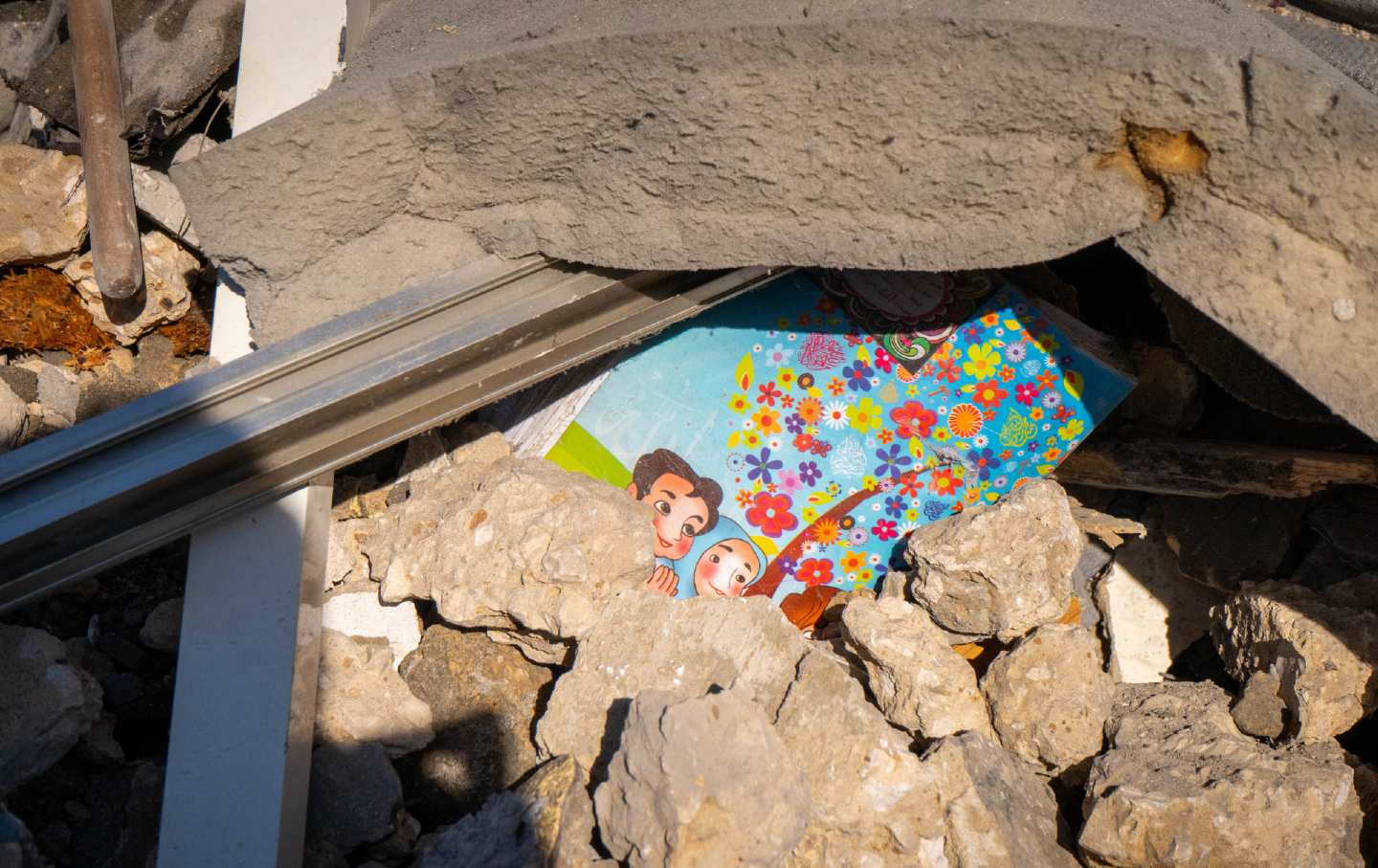
Stop Sending American Bombs to Israel Stop Sending American Bombs to Israel
Halting offensive arms transfers now would put the administration on a new path—and align Harris with the majority of Democrats who support conditions on weapons aid to Israel.
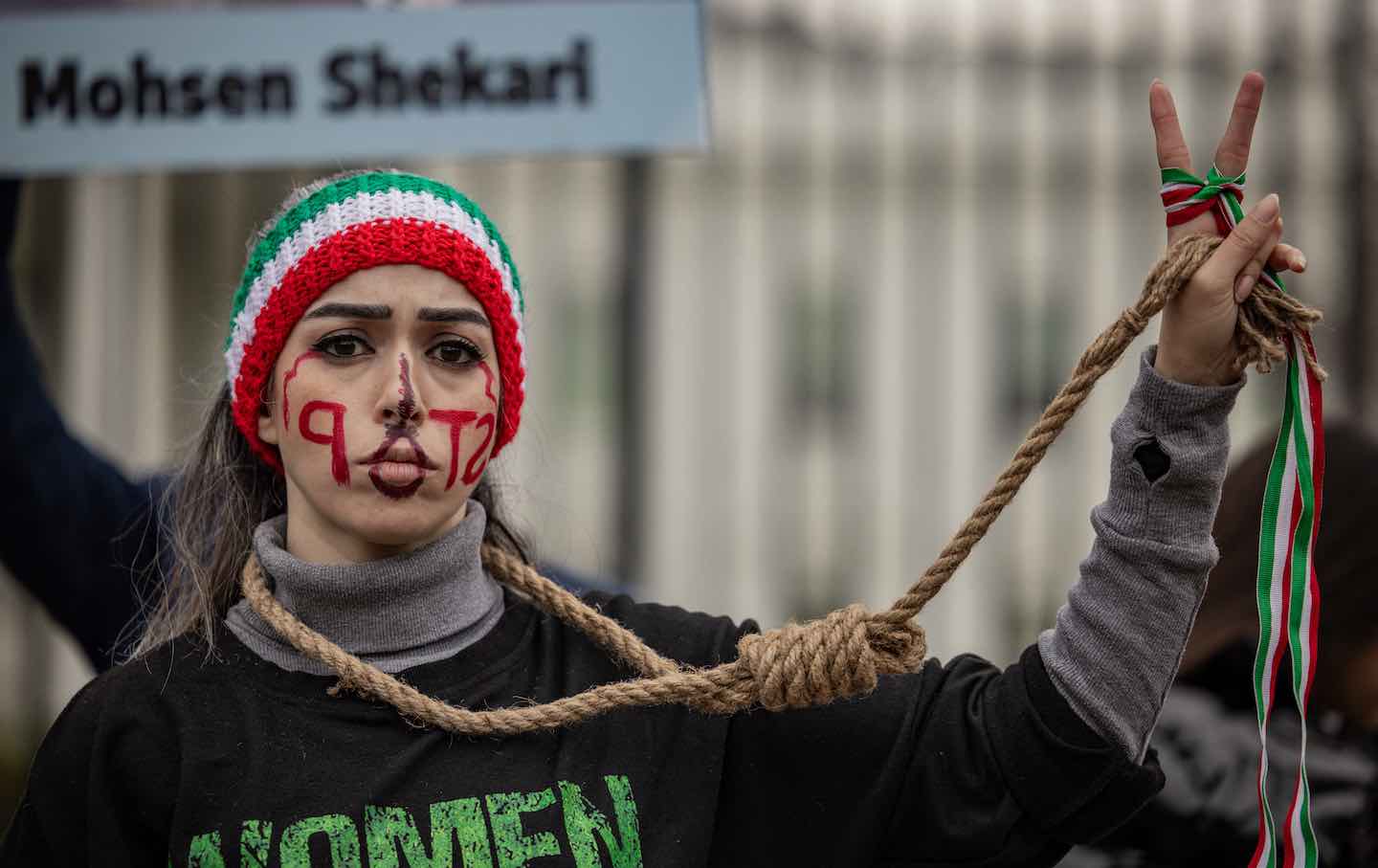
Women Are Leading the Resistance Against Executions in Iran Women Are Leading the Resistance Against Executions in Iran
Their prominence in the ongoing struggle for human rights has been met with fierce crackdowns by the state.
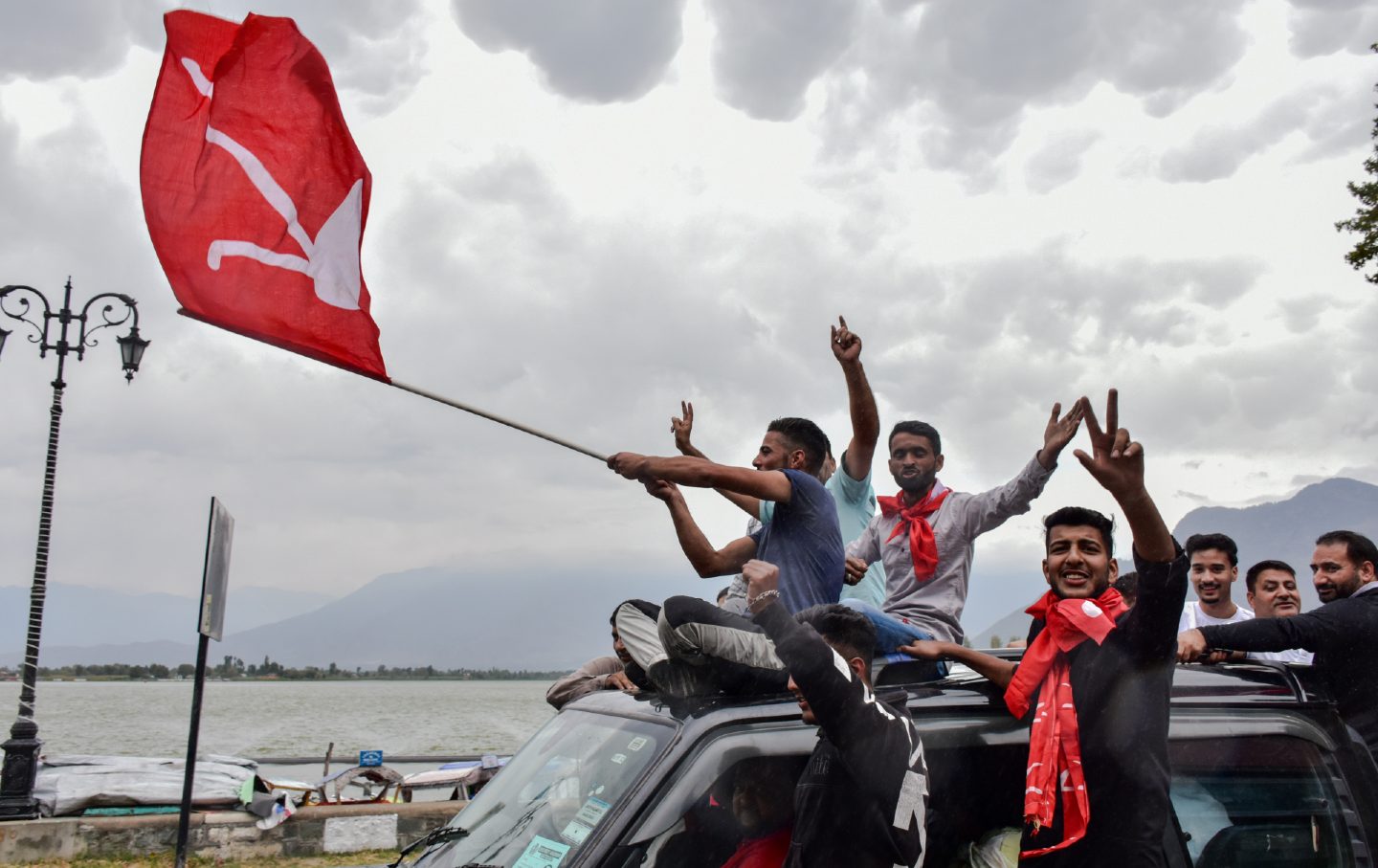
The Party Promising Kashmiri Statehood Wins an Election The Party Promising Kashmiri Statehood Wins an Election
In the first vote since India revoked the statehood status of Jammu and Kashmir, the National Conference party emerged with the most seats in the Legislative Assembly.

“The Israeli Army Martyred My Father”: What Gaza's Journalists Have Endured “The Israeli Army Martyred My Father”: What Gaza's Journalists Have Endured
Three Palestinian journalists describe what it is like to report from the middle of a genocide.
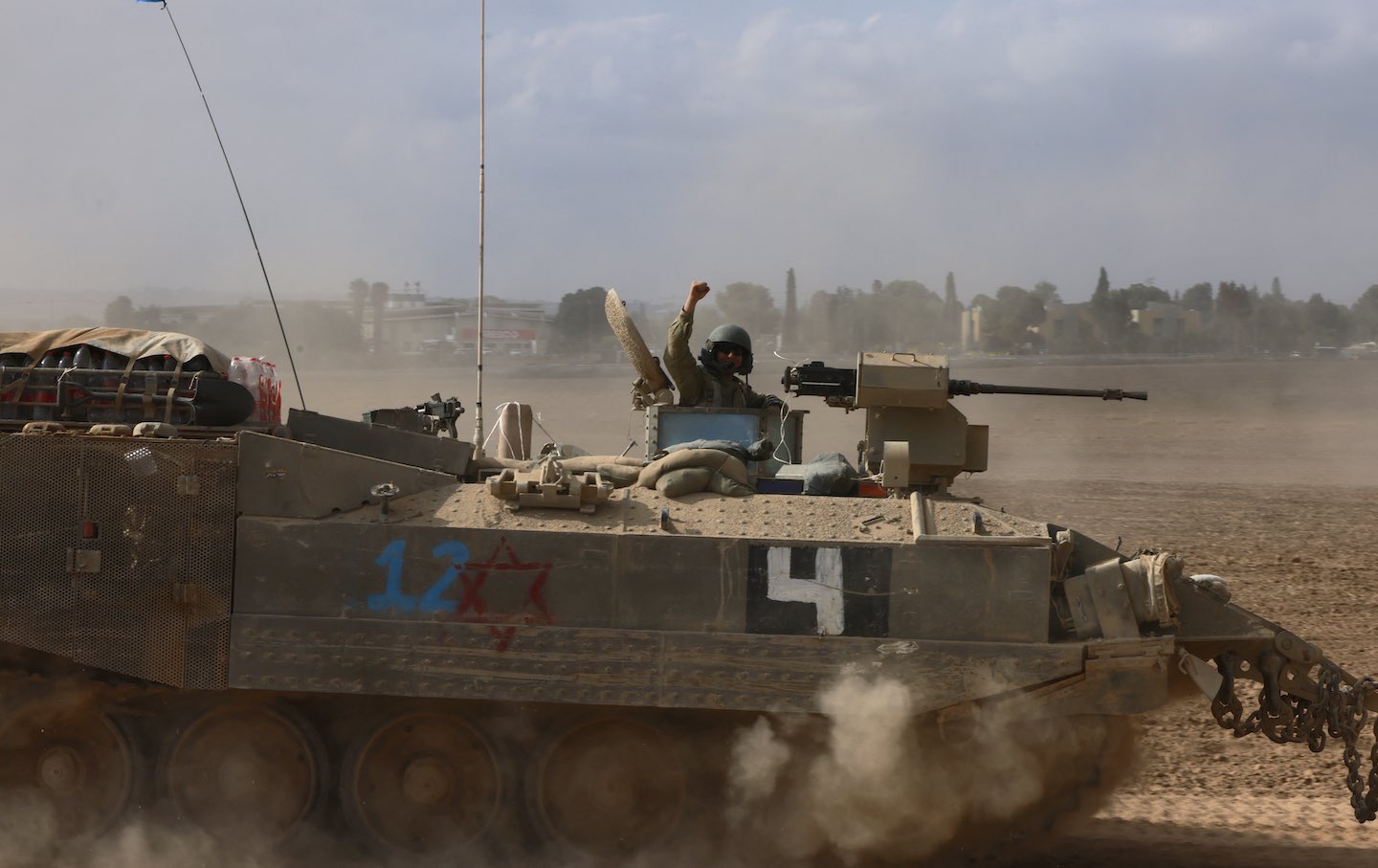
Israel Is Killing Whole Families in Gaza—With Weapons Made in America Israel Is Killing Whole Families in Gaza—With Weapons Made in America
Five-year old Hind Rajab was the victim of a bomb manufactured in Iowa. Months later, the Biden administration is still sending weapons.
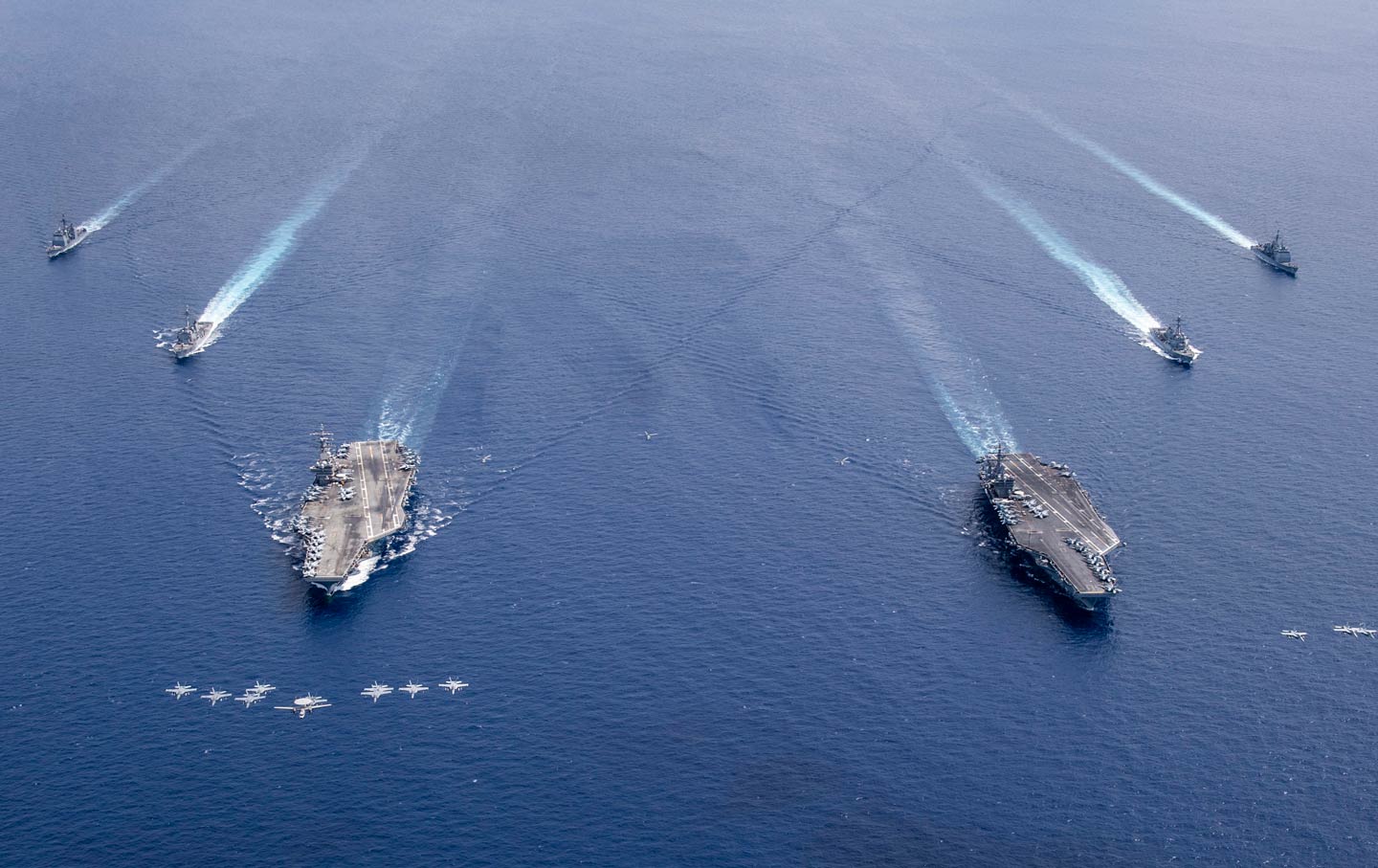
The New Cold War in the Pacific Is Dangerously Close to Heating Up The New Cold War in the Pacific Is Dangerously Close to Heating Up
Bristling with armaments and seemingly strong, the current ad hoc Western coalition may yet prove, like NATO, vulnerable to sudden setbacks from rising partisan pressure...


